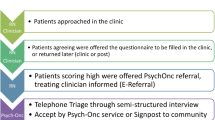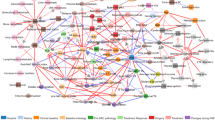Abstract
The aim of the study was to confirm the validity of using touchscreen computers for screening for clinically significant levels of distress among cancer patients in routine oncology practice. The Hospital Anxiety and Depression Scale (HADS), EORTC Quality of Life questionnaire (QLQ-C30), Mental Health Inventory-MHI5 and a Concerns Checklist were administered via touchscreen computer to 172 chemotherapy out-patients, twice, 2–4 weeks apart. A standard psychiatric interview (Present State Examination – PSE) was conducted within a week of the second assessment. On interview, 23% of patients were identified as ‘cases’. Using the available data (questionnaires, sociodemographic details, self-reported past psychiatric history), the best screening strategy combined scores from MHI-5 and HADS from a single time-point with the following rules: if MHI-5 < 11 = non-case; if MHI-5 ≥ 11 then use HADS; then, if HADS ≥ 9 = ‘case’ (sensitivity 85%; specificity 71%; misclassification rate 26%; positive predictive value 47%). The computerized screening system enabled data to be collected, scored, collated and reported in real time to identify patients who warrant further clinical assessment. It offers the potential for improving ‘case’ detection in routine oncology practice while reducing the burden of questions put to ‘non-cases’. Further work is needed to develop optimal choice of screening questions for this purpose. © 2001 Cancer Research Campaign http://www.bjcancer.com
Similar content being viewed by others
Article PDF
Change history
16 November 2011
This paper was modified 12 months after initial publication to switch to Creative Commons licence terms, as noted at publication
References
Aapro M and Cull A (1999) Depression in breast cancer patients: the need for treatment. Annal Oncol 10: 627–636
Aaronson NK, Ahmedzai S and Bergman B (1993) The European Organization for Research and Treatment of Cancer (EORTC): A quality of life instrument for use in international clinical trials in oncology. J Natl Cancer Inst 85: 365–376
Armitage P (1971) Statistical Methods in Medical Research. Blackwell: Oxford
Berard RMF, Boer Meester F and Viljoen G (1998) Depressive disorders in an outpatient oncology Setting: Prevalence Assessment and Management. PsychoOncology 7: 112, 120
Berwick DM, Murphy JM and Goldman PA (1991) Performance of a five item mental health screening test. Medical Care 29: 169–176
Carstairs V and Morris R (1991) Deprivation and Health in Scotland. Aberdeen University Press: Aberdeen
Chochinov HM, Wilson KG and Enns M (1997) Are you depressed? Screening for depression in the terminally ill. Am J Psychiatry 154: 674–676
Cull A, Stewart M and Altman DG (1995) Assessment of and Intervention for Psychosocial Problems in Routine Oncology Practice. Brit J Cancer 72: 229–235
Detmar SB and Aaronson NK (1998) Quality of Life Assessment in Daily Clinical Oncology Practice: A feasibility study. Eur J Cancer 34(8): 1181–1186
Fallowfield L, Lipkin M and Hall A (1998) Helping senior oncologists communication skills: Results from Phase 1 of a Comprehensive Longitudinal Program in the United Kingdom. J Clin Oncol 16: 1961–1968
Fallowfield L, Ratcliffe D and Jenkins V (2001) Psychiatric morbidity and its recognition by doctors in patients with cancer. Brit J Cancer 84: 1011–1015
Gilbody SM, House AO and Sheldon TA (2001) Routinely administered questionnaires for depression and anxiety: systematic review. Brit Med J 322: 406–409
Hall A, A’Hern R and Fallowfield L (1999) Are we using appropriate self report questionnaires for detecting anxiety and depression in women with early breast cancer. Eur J Cancer 35: 79–85
Harrell FE, Margolis PA and Gove S (1998) Development of a clinical prediction model for ordinal outcomes. Statistics in Medicine 17: 909–944
Harrell FE (2000). Regression Modeling Strategies with Applications to Survival Analysis, and Logistic Regression, Springer-Verlag: New York
Harrison J, Maguire P and Ibbotson T (1994) Concerns cofiding and psychiatric disorder in newly diagnosed cancer patients: A descriptive study. PsychoOncology 3: 173–179
Hopwood P, Howell A and Maguire P (1991a) Psychiatric morbidity in patients with advanced cancer of the breast: prevalence by two self rating questionnaires. Brit J Cancer 64: 349–352
Hopwood P, Howell A and Maguire P (1991b) Screening for psychiatric morbidity in patients with advanced breast cancer: validation of two self report questionnaires. Brit J Cancer 64: 353–356
Ibbotson T, Maguire P and Selby P (1994) Screening for Anxiety and Depression in Cancer Patients: The effects of disease and treatment. Eur J Cancer 30A: 37–40
Maguire P (1985) Psychological morbidity associated with cancer and cancer treatment. Clin Oncol 4: 559–575
Maguire P, Faulkner A and Booth K (1996) Helping cancer patients disclose their concerns. Eur J Cancer 32A: 78–81
McCullagh P and Nelder JA (1989) Generalised Liner Models. Chapman and Hall: London
Meyer TJ and Mark MM (1995) Effects of psychosocial interventions with adult cancer patients: A meta analysis of randomised experiments. Health Psychology 14: 101–108
Murphy J, Berwick D and Weinstein M (1987) Performance of screening and diagnostic tests: application of receiver operating characteristic analysis. Arch Gen Psychiatr 44: 550–555
Newell S, Samson-Fisher R and Girgis A (1998) How well do medical oncologists perceptions reflect their patients reported physical and psychosocial problems?. Cancer 83: 1640–1651
Pinder KL, Ramirez AJ and Black E (1993) Psychiatric disorders in patients with advanced breast cancer: prevalence and associated factors. Eur J Cancer 29A: 524–527
Ramirez AJ and House A (1997) Common mental health problems in hospital. Brit Med J 314: 1679–1681
Ramirez AJ, Richards MA and Jarrett SR (1995) Can mood disorder in women with breast cancer be identified pre-operatively?. Brit J Cancer 72: 1509–1512
Razavi D, Delvaux N and Faracques C (1990) Screening for adjustment disorders and major depressive disorders in cancer in patients. Brit J Psychiatry 156: 79–83
Razavi D, Delvaux N and Bredart A (1992) Screening for psychiatric disorders in a lymphoma outpatient population. Eur J Cancer 28A: 1869–1872
Revicki DA and Cella DF (1997) Health status assessment for the twenty-first century: Item response theory, item banking and computer adaptive testing. Quality of Life Research 6: 595–600
Robertson MM and Katona CC (1997) Depression and Physical Illness. John Wiley and Sons: Chichester
S-Plus User’s Guide. (1997) Data Analysis Products Division, Mathsoft: Seattle
Velikova G, Wright EP and Smith (1999) Automated collection of quality of life data: A comparison of paper and computer touchscreen questionnaires. J Clin Oncol 17: 998–1007
Venables WN and Ripley BD (1997) Modern Applied Statistics with S-Plus. Springer: New York
Ware JE (1993) SF-36 Health Survey: Manual and Interpretation Guide. New England Medical Center: Boston, MA
Wing J, Cooper J and Sartorious N (1974). Measurement and Classification of Psychiatric Symptoms, Cambridge,Cambridge University Press
Zigmond A and Snaith R (1983) The Hospital Anxiety and Depression Scale. Acta Psychiatr Scand 67: 361–367
Author information
Authors and Affiliations
Rights and permissions
From twelve months after its original publication, this work is licensed under the Creative Commons Attribution-NonCommercial-Share Alike 3.0 Unported License. To view a copy of this license, visit http://creativecommons.org/licenses/by-nc-sa/3.0/
About this article
Cite this article
Cull, A., Gould, A., House, A. et al. Validating automated screening for psychological distress by means of computer touchscreens for use in routine oncology practice. Br J Cancer 85, 1842–1849 (2001). https://doi.org/10.1054/bjoc.2001.2182
Received:
Revised:
Accepted:
Published:
Issue date:
DOI: https://doi.org/10.1054/bjoc.2001.2182
Keywords
This article is cited by
-
Acceptability of a Touch Screen Tablet Psychosocial Survey Administered to Radiation Therapy Patients in Japan
International Journal of Behavioral Medicine (2016)
-
Feasibility and acceptance of electronic monitoring of symptoms and syndromes using a handheld computer in patients with advanced cancer in daily oncology practice
Supportive Care in Cancer (2014)
-
No personalization without participation: on the active contribution of psychiatric patients to the development of a mobile application for mental health
BMC Medical Informatics and Decision Making (2013)
-
A mixed methods approach to adapting health-related quality of life measures for use in routine oncology clinical practice
Quality of Life Research (2012)
-
Accuracy of the Hospital Anxiety and Depression Scale as a screening tool in cancer patients: a systematic review and meta-analysis
Supportive Care in Cancer (2011)



